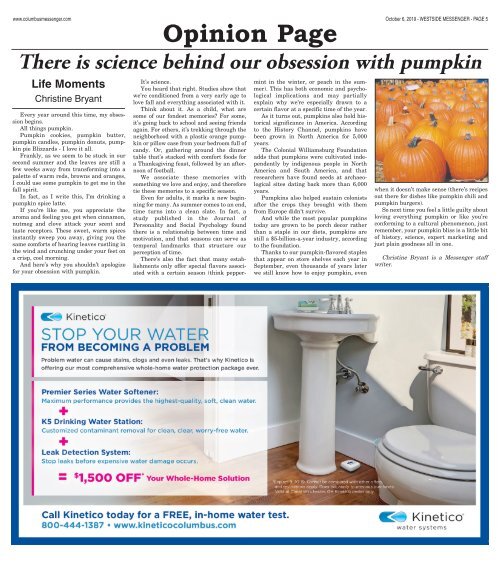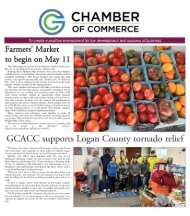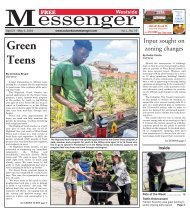Westside Messenger - October 6th, 2019
Create successful ePaper yourself
Turn your PDF publications into a flip-book with our unique Google optimized e-Paper software.
www.columbusmessenger.com <strong>October</strong> 6, <strong>2019</strong> - WESTSIDE MESSENGER - PAGE 5<br />
Opinion Page<br />
There is science behind our obsession with pumpkin<br />
Life Moments<br />
Christine Bryant<br />
Every year around this time, my obsession<br />
begins.<br />
All things pumpkin.<br />
Pumpkin cookies, pumpkin butter,<br />
pumpkin candles, pumpkin donuts, pumpkin<br />
pie Blizzards - I love it all.<br />
Frankly, as we seem to be stuck in our<br />
second summer and the leaves are still a<br />
few weeks away from transforming into a<br />
palette of warm reds, browns and oranges,<br />
I could use some pumpkin to get me in the<br />
fall spirit.<br />
In fact, as I write this, I’m drinking a<br />
pumpkin spice latte.<br />
If you’re like me, you appreciate the<br />
aroma and feeling you get when cinnamon,<br />
nutmeg and clove attack your scent and<br />
taste receptors. These sweet, warm spices<br />
instantly sweep you away, giving you the<br />
same comforts of hearing leaves rustling in<br />
the wind and crunching under your feet on<br />
a crisp, cool morning.<br />
And here’s why you shouldn’t apologize<br />
for your obsession with pumpkin.<br />
It’s science.<br />
You heard that right. Studies show that<br />
we’re conditioned from a very early age to<br />
love fall and everything associated with it.<br />
Think about it. As a child, what are<br />
some of our fondest memories? For some,<br />
it’s going back to school and seeing friends<br />
again. For others, it’s trekking through the<br />
neighborhood with a plastic orange pumpkin<br />
or pillow case from your bedroom full of<br />
candy. Or, gathering around the dinner<br />
table that’s stacked with comfort foods for<br />
a Thanksgiving feast, followed by an afternoon<br />
of football.<br />
We associate these memories with<br />
something we love and enjoy, and therefore<br />
tie these memories to a specific season.<br />
Even for adults, it marks a new beginning<br />
for many. As summer comes to an end,<br />
time turns into a clean slate. In fact, a<br />
study published in the Journal of<br />
Personality and Social Psychology found<br />
there is a relationship between time and<br />
motivation, and that seasons can serve as<br />
temporal landmarks that structure our<br />
perception of time.<br />
There’s also the fact that many establishments<br />
only offer special flavors associated<br />
with a certain season (think peppermint<br />
in the winter, or peach in the summer).<br />
This has both economic and psychological<br />
implications and may partially<br />
explain why we’re especially drawn to a<br />
certain flavor at a specific time of the year.<br />
As it turns out, pumpkins also hold historical<br />
significance in America. According<br />
to the History Channel, pumpkins have<br />
been grown in North America for 5,000<br />
years.<br />
The Colonial Williamsburg Foundation<br />
adds that pumpkins were cultivated independently<br />
by indigenous people in North<br />
America and South America, and that<br />
researchers have found seeds at archaeological<br />
sites dating back more than 6,000<br />
years.<br />
Pumpkins also helped sustain colonists<br />
after the crops they brought with them<br />
from Europe didn’t survive.<br />
And while the most popular pumpkins<br />
today are grown to be porch decor rather<br />
than a staple in our diets, pumpkins are<br />
still a $5-billion-a-year industry, according<br />
to the foundation.<br />
Thanks to our pumpkin-flavored staples<br />
that appear on store shelves each year in<br />
September, even thousands of years later<br />
we still know how to enjoy pumpkin, even<br />
when it doesn’t make sense (there’s recipes<br />
out there for dishes like pumpkin chili and<br />
pumpkin burgers).<br />
So next time you feel a little guilty about<br />
loving everything pumpkin or like you’re<br />
conforming to a cultural phenomenon, just<br />
remember, your pumpkin bliss is a little bit<br />
of history, science, expert marketing and<br />
just plain goodness all in one.<br />
Christine Bryant is a <strong>Messenger</strong> staff<br />
writer.


















